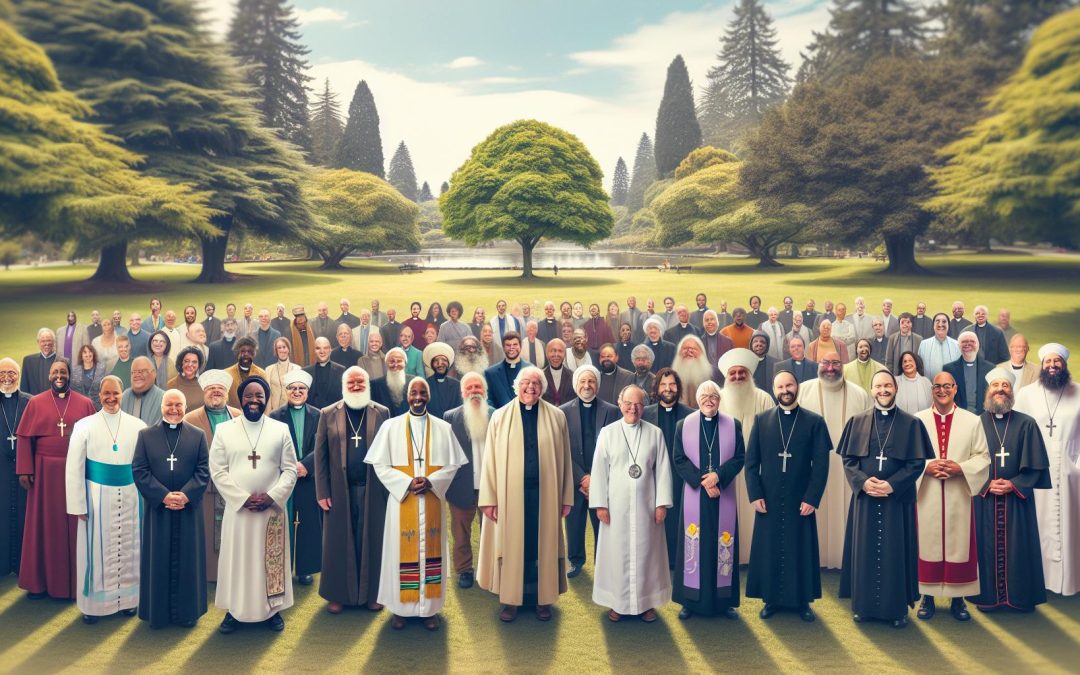Nestled in the heart of the Pacific Northwest, Mercer Island isn’t just known for its picturesque views and serene environment—it’s a vibrant tapestry of diverse beliefs and cultures. As someone who’s always been fascinated by how communities grow stronger through understanding, I find Mercer Island’s commitment to interfaith dialogue truly inspiring.
Here on the island, people from various religious backgrounds come together to share their stories and traditions, creating a space where empathy and respect flourish. It’s not just about talking; it’s about listening and learning from one another. This ongoing dialogue fosters a sense of belonging and unity that transcends differences.
By engaging in these conversations, Mercer Islanders are building bridges that connect rather than divide. It’s a powerful reminder of what can be achieved when we open our hearts and minds to the rich diversity surrounding us. Join me as I explore how this community is setting an example for others to follow.
The Essence of Interfaith Dialogue
Interfaith dialogue on Mercer Island embodies a rich tapestry of interactions between individuals of different faiths. Its core lies in the willingness to listen and share perspectives. Through these exchanges, people explore diverse beliefs, uncovering common values and building a cohesive community. This dialogue opens doors to understanding each other’s traditions, customs, and the motivations behind them.
Conversations often reveal intriguing similarities among religions, such as shared ethical principles or narratives, which nurture a sense of shared humanity. The dialogue transcends mere tolerance, fostering genuine acceptance and collaboration between residents. As people engage in meaningful conversations, barriers break down, making space for authentic relationships. This collaborative spirit reflects in community initiatives that tackle shared challenges, emphasizing unity over division.
Engagement often takes place in forums, workshops, or informal gatherings, each offering a unique environment for dialogue. These settings encourage participants to reflect on their beliefs and learn from others, expanding their worldview. The essence of these dialogues isn’t about reaching consensus but about appreciating the rich diversity that exists within the community.
Youth involvement is crucial, with programs designed to include students in interfaith conversations. Schools and community groups organize events where young people learn to appreciate different perspectives. This early exposure promotes empathy and understanding, shaping a new generation skilled in cultural competencies.
Leadership from various faith communities on Mercer Island drives many initiatives. Clergy and community leaders organize events that address pressing social issues, using the strength of interfaith dialogue to inspire collective action. This leadership ensures a continued commitment to exploring diverse perspectives and nurturing a respectful community spirit.
Mercer Island’s approach to interfaith dialogue is a model worth noting. While embracing diversity, it also respects individual journeys of faith and expression. This balance is key to creating a community where everyone feels valued and heard. Interfaith dialogue becomes more than just conversation; it’s a vital part of the community fabric, enhancing both personal and communal growth.
Mercer Island’s Unique Approach
Mercer Island seamlessly integrates interfaith dialogue into daily life, harnessing local leadership and community engagement to foster connection and understanding.
The Role of Local Leaders
Local leaders play a pivotal role in driving Mercer Island’s interfaith dialogue. Clergy members, educators, and civic leaders collaboratively create platforms that encourage open discussions among faith groups. These leaders regularly host events, such as interfaith panels and educational seminars, where residents can engage in meaningful conversations. Their commitment to inclusivity sets a precedent, inspiring others in the community to explore a wide array of religious and cultural perspectives.
Leadership’s proactive approach ensures that diverse voices are heard, making dialogue accessible to all age groups and backgrounds. By addressing contemporary social issues through an interfaith lens, they validate the experiences and beliefs of different community members. This dynamic engagement helps cultivate an environment where everyone feels valued, regardless of religious affiliation.
Community Involvement and Support
The community on Mercer Island actively supports interfaith dialogue initiatives, reflecting a collective commitment to unity and understanding. Residents participate in various programs, including cultural festivals, discussion groups, and volunteer projects, which serve as conduits for sharing and learning. With opportunities available year-round, the community’s enthusiasm reinforces the importance of dialogue in daily interactions.
Local organizations and institutions often collaborate, providing resources and spaces for interfaith activities. This support enhances the reach of initiatives, enabling more residents to partake in events. Community members, recognizing the benefits of such dialogue, offer continued backing by volunteering time and expertise. This shared investment in interfaith activities strengthens bonds and encourages a spirit of cooperation, fostering a resilient and inclusive community fabric.
Events and Initiatives
Mercer Island hosts a variety of events and initiatives to promote interfaith dialogue and community building. Residents engage in meaningful activities that encourage understanding and collaboration.
Annual Interfaith Workshops
Each year, Mercer Island organizes workshops focusing on interfaith understanding. Leaders from various religious backgrounds collaborate to design interactive sessions. These workshops offer an opportunity for residents to learn about different faiths through discussions and activities. A highlight of these workshops is the panel discussions where faith leaders share insights and engage with participants’ questions. Last year’s workshop focused on the theme of compassion across religions, drawing over 150 attendees. Interactive group sessions follow the panels, providing a space for participants to share personal experiences and reflections. Workshops emphasize active listening and communication, creating an environment where diverse perspectives find a voice. Community feedback guides the topics and structure of each workshop, ensuring relevance and inclusivity. This annual event remains a cornerstone of Mercer Island’s commitment to interfaith engagement.
Community Service Projects
Community service projects play a vital role in Mercer Island’s interfaith initiatives. These projects unite residents in common goals, transcending religious and cultural boundaries. Volunteering opportunities include environmental clean-ups, building homes for those in need, and organizing food drives. The annual “Faith in Action Day” brings together volunteers from over ten faith communities to address local challenges. Participants not only contribute their time and skills but also build friendships and foster mutual respect. Last year, the collaborative efforts resulted in 1,000 meals prepared for local shelters and over 300 hours spent on trail restoration. Faith leaders organize these projects, inviting community members to contribute and learn from one another. In these projects, the spirit of cooperation and understanding strengthens the fabric of the Mercer Island community.
Challenges and Opportunities
Mercer Island’s interfaith dialogue presents both challenges and opportunities that influence community dynamics positively. Recognizing these aspects enhances the ability to foster a harmonious environment.
Addressing Misconceptions
Misconceptions about different faiths can hinder dialogue on Mercer Island. Unfounded beliefs create barriers to understanding, leading to division. Open communication directly dispels myths and promotes clarity. Community forums on Mercer Island have helped counter stereotypes by sharing authentic stories. Educators and faith leaders collaborate to design programs addressing specific misconceptions, allowing individuals to engage with factual information. Educational resources distributed in schools and community centers provide access to accurate content, reducing prejudice. It’s critical to maintain a safe space where residents feel comfortable voicing concerns. By respecting diverse viewpoints and facilitating honest conversations, Mercer Island strengthens its commitment to fostering inclusivity.
Building Lasting Connections
Mercer Island’s community-building efforts capitalize on shared experiences, paving the way for enduring relationships. By organizing regular interfaith activities such as workshops and service projects, the community nurtures collaboration. Residents engage in cultural festivals where diverse traditions are celebrated together, fostering mutual respect. Cross-faith volunteer initiatives unite individuals in common goals, transcending ethnic and religious boundaries. These interactions often lead to friendships, extending beyond formal settings. The inclusive environment encourages residents to share personal narratives, deepening understanding and empathy. Regular engagement ensures that these connections become integral to the community’s fabric, enhancing resilience and solidarity across Mercer Island.
Success Stories from Mercer Island
Residents of Mercer Island have created remarkable examples of interfaith dialogue success. These stories highlight personal growth and strengthening community ties across diverse faiths.
Personal Testimonies
Several residents have shared incredible personal narratives that showcase the transformative power of dialogue. One local teacher expressed gratitude for participating in interfaith workshops, discovering a renewed sense of empathy for students from different backgrounds. A young volunteer from a community service project revealed how collaborating with peers from various faiths opened her eyes to shared values and strengthened her ability to communicate across cultural divides. An elder from the Jewish community found a deep connection with Muslim neighbors, leading to regular meetings that enriched their lives. These stories illustrate how individuals experience profound changes when engaging with diverse beliefs and listening to others.
Impact on Community Cohesion
Mercer Island’s interfaith efforts have significantly boosted community cohesion. For example, annual cultural festivals bring together people from all walks of life, fostering friendships and understanding. The island’s inclusive approach encourages cross-faith family gatherings, creating bonds that extend to everyday activities. Local faith leaders report an increase in collaborative projects that address common social challenges, emphasizing unity over division. Through interfaith dialogue, the community has woven a tapestry of trust, promoting a cohesive environment where residents feel respected and valued. These successes demonstrate how embracing and understanding faith diversity can strengthen the community fabric.
Conclusion
Reflecting on Mercer Island’s vibrant interfaith dialogue and community-building efforts fills me with hope. It’s inspiring to see how the island embraces diversity and fosters genuine connections among its residents. The commitment to understanding and respect transcends mere tolerance, creating a community where everyone feels valued.
Through workshops, cultural festivals, and collaborative projects, Mercer Island exemplifies the power of unity in diversity. The active participation of local leaders and residents in these initiatives showcases the island’s dedication to inclusivity. It’s a testament to what can be achieved when we come together to learn, share, and grow.
These efforts not only enhance personal growth but also strengthen community ties, making Mercer Island a model for others to follow. I’m encouraged by the stories of transformation and the friendships formed across different faiths. It’s a beautiful reminder that embracing our differences can lead to a more cohesive and resilient community.




0 Comments